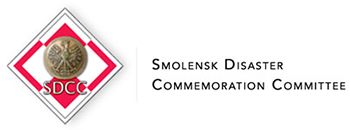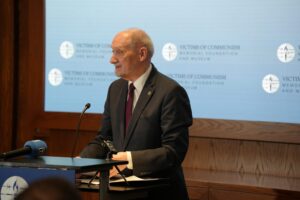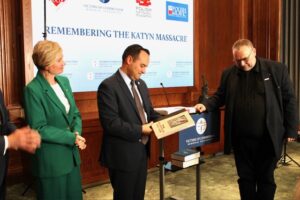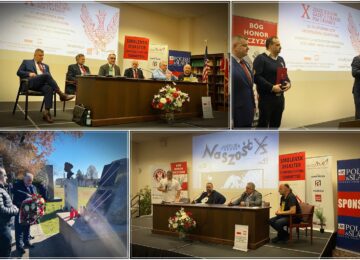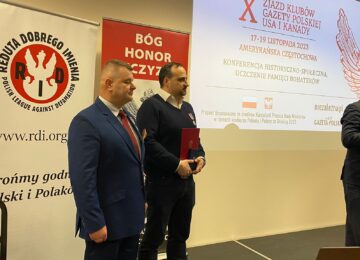Commemoration of the Victims of the Katyn and Smolensk Crimes and the War in Ukraine at the Museum of the Victims of Communism in Washington, D.C.
Poland and its history were recently discussed at the Museum of the Victims of Communism in Washington, D.C., the heart of the diplomatic world. On April 25, 2023, the conference “Remembering the Katyn Massacre” took place, having been organized by the Smolensk Disaster Commemoration Committee and the Museum of the Victims of Communism. All sessions were conducted in English.
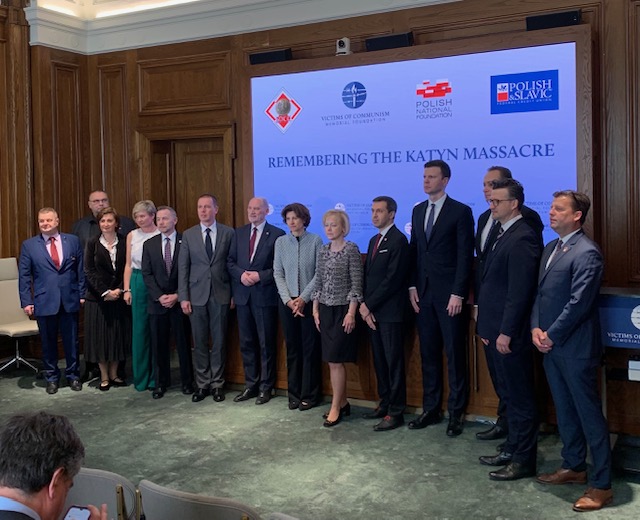 The conference had three components: (a) remembrance of the victims of the Katyn Massacre, Smolensk Disaster and the Ukraine War, (b) a panel discussion regarding the Katyn Massacre and (c) a musical performance by Paweł Piekarczyk, a Polish artist. The goal of the conference was to communicate with American leadership and the international diplomatic corps. The attendees included the Latvian Ambassador Maris Selga, the Lithuanian Ambassador Audra Plepyte, in lieu of the Polish Ambassador, the Deputy Chief of Mission at the Polish Embassy in the US, Adam Krzywosadzki, and the Polish Naval Attaché to the US, Captain Maciej Stadnicki, the Deputy Chief of Mission at the Ukrainian Embassy in the US, Yaroslav Brisiuck, a member of Bulgarian Embassy in US and a member of the Independent Society of Belarus in the US.
The conference had three components: (a) remembrance of the victims of the Katyn Massacre, Smolensk Disaster and the Ukraine War, (b) a panel discussion regarding the Katyn Massacre and (c) a musical performance by Paweł Piekarczyk, a Polish artist. The goal of the conference was to communicate with American leadership and the international diplomatic corps. The attendees included the Latvian Ambassador Maris Selga, the Lithuanian Ambassador Audra Plepyte, in lieu of the Polish Ambassador, the Deputy Chief of Mission at the Polish Embassy in the US, Adam Krzywosadzki, and the Polish Naval Attaché to the US, Captain Maciej Stadnicki, the Deputy Chief of Mission at the Ukrainian Embassy in the US, Yaroslav Brisiuck, a member of Bulgarian Embassy in US and a member of the Independent Society of Belarus in the US.
Ken Pope, Director of the Museum, and Tadeusz Antoniak, the Chairman of the Smolensk Disaster Commemoration Committee, welcomed the attendees, and Mr. Antoniak discussed the Committee’s recent accomplishments and going forward objectives. Then, Ambassador Aldona Woś, M.D., a Trustee of the Victims of Communism Memorial Foundation, President of the Institute of World Politics and former US Ambassador to Estonia, gave a very emotional presentation regarding her father’s story of his survival of the Katyn Massacre. She thanked the Committee and the Museum for their work and emphasized that the Katyn Massacre is not only a historical event but is also emblematic of ongoing crimes that the Western World must remain vigilant against.
Then Senior Marshal Antoni Macierewicz, a Member of the Polish Parliament, spoke and compared the Katyn Massacre to the assassination carried out through the Smolensk Disaster and noted that the events in Smolensk were a prelude to the Russian invasion of Ukraine. He warned that imperialism can take many forms – some violent and some simply bureaucratic – and that we must be cognizant of, and dedicated to resisting both methods. He emphasized the resistance of free peoples to imperialism and all of its methods may not immediately pay dividends but that, over the course of time, such resistance will allow us to maintain the freedom that we all cherish and that this lesson, more than any others, must be the rule for modern Europe and the whole world.
All speakers emphasized that the Russian playbook consistently called for the elimination of the Polish elite to increase their zone of influence, and that today, the Russians have followed this approach in Ukraine but have also heightened their criminality by kidnapping tens of thousands of Ukrainian children. They reiterated how important it is for the Western World to strongly resist these crimes.
Next an appeal of remembrance and a moment of silence was held to honor the victims of all three events – Katyn, Smolensk and Ukraine – which was read by the Committee members while pictures of victims were shown to the audience. Thereafter, a panel discussion arose moderated by Ambassador Andrew Bremberg, the President of the Victims of Communism Memorial Foundation.
Dr. Karol Polejowski’s, Deputy President of the National Institute of Remembrance in Poland, presentation about the Katyn crime—”Russian Revenge and the Communist Genocide of the Polish Officers” – was read aloud, outlining the objectives of the Russian crimes at Katyn.
Filip Frąckowiak, the Chairman of the General Kuklinski Cold War Museum in Warsaw and General Kuklinski Institute of America, discussed the consequences of the Katyn Massacre on Polish society and the Polish Army from the end of the war through 1989.
Ambasdor Andrew Bremberg, in his ending speech, thanked all speakers and attendees for being present. He said that he knew that he did not need to remind the Polish friends in attendance how important it is to remember the criminal events that had been discussed. He further stated that the victims of Katyn Massacre should maintain a special and important place in the museum and that his mission, and that of his group, was to educate the American society on how all of us should respond to the evils that are still present in today’s world. He also stated that he is convinced that remembrance of, and then honoring of, such victims is the only way to prevent the spread of such evil, but, unfortunately, that today’s world too frequently tries to forget or trivialize such matters.
The event concluded with a musical performance by Mr. Piekarczyk that featured the translation of his words and pictures supporting his performance which elicited an emotional response from the audience.
The Museum itself is located in Washington, a mere 300 meters from the White House. The Museum’s exhibitions presented the victims, the actions of the Russians throughout history and details about the crimes of Communism throughout history, both in Poland and elsewhere.
The conference was financially supported by the Polish National Foundation, the Polish & Slavic Federal Credit Union, the General Kuklinski Institute in New York and Windows-Okna.
